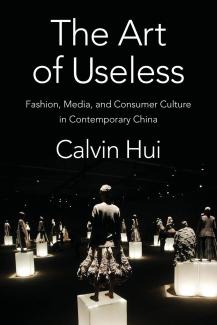Event
 The Art of Useless: Fashion, Media, and Consumer Culture in Contemporary China
The Art of Useless: Fashion, Media, and Consumer Culture in Contemporary China
Calvin Hui, Class of 1952 Distinguished Associate Professor of Chinese Studies, College of William & Mary

My book, titled The Art of Useless: Fashion, Media, and Consumer Culture in Contemporary China, argues that popular and media cultures are central to understanding China’s unprecedented political, economic, social, and ideological transformations. The first part of the book stages an analysis of a commodity chain of fashion involving production, consumption, and disposal. The second part delves into the representations of fashion and consumption in Chinese cinema in the 1960s (the revolutionary period), the 1980s (the economic reforms period), and the 2000s (the globalization period). Such portrayals reveal the symptoms of China’s historical contradictions. They also serve as a screen onto which the emerging middle-class desires and fantasies are projected and negotiated. Turning to the undersides of consumption, the third part discusses labor (what comes before consumption) and waste (what comes after consumption). It explains how the migrant factory workers, the scavengers, and garbage are rendered invisible in the process of consumption. My book is not useless but useful! It demonstrates the relevance of cultural studies in investigating the complexity of Chinese media and popular cultures.
In this talk, I present an aspiring Chinese fashion designer Ma Ke and her fashion exhibit Useless (2007). Ma intends to draw attention to the loss of the emotional bond between the maker and the user of clothes in the age of industrialized mass production and consumption. To help fashion recover this lost memory, Ma buries her apparel under dirt for a period of time. When the garment is unearthed, she reasons, it will find itself imbued with the imprint of the time and space of its soil. Presented at Paris Fashion Week in February 2007, Ma’s fashion exhibit Useless was intended to be a critique of modern consumer culture. My analysis then turns to Jia Zhangke’s documentary film Useless (2007), a transmedial dialogue with Ma’s fashion exhibit Useless. What characterizes the Useless documentary is its tripartite structure. Contrary to the second part of the documentary, which focuses on Ma’s middle-class fashion, the first part features a group of laborers in a garment factory in China’s Guangdong Province. These workers produce Ma’s first fashion line, Exception. Linking consumption to production, the director emphasizes the fact that Ma’s fashion is manufactured by the Chinese factory workers. The third part of the documentary turns to the working class in China’s Shanxi Province. With the rise of the market economy, the local tailors cannot compete with factories and department stores. To make a living, some tailors have to work as coal miners; thus, their expertise is rendered useless. In this talk, I argue that Jia’s documentary engagement with Ma’s fashion is double-edged: although he embraces some parts of Useless, he critiques other parts of her design. I demonstrate how the director brings a new level of visual complexity to the designer’s antifashion and anticonsumption gesture through the use of montage.
Calvin Hui is a Class of 1952 Distinguished Associate Professor of Chinese Studies at the College of William & Mary in the United States. His book, titled The Art of Useless: Fashion, Media, and Consumer Culture in Contemporary China, was published by Columbia University Press in 2021. This project was supported by a 2019 American Council of Learned Societies (ACLS) fellowship. He has recently received a Chiang Ching-kuo Foundation Scholar Grant and a China – U.S. Scholars Program (CUSP) fellowship.
Open to all, informal lunch served. This event is held onsite with a Zoom session. Please register in advance here:
https://upenn.zoom.us/meeting/register/tJMrf-iopzwoHdetCUFEy-KtpLXkHF5Dje1W
